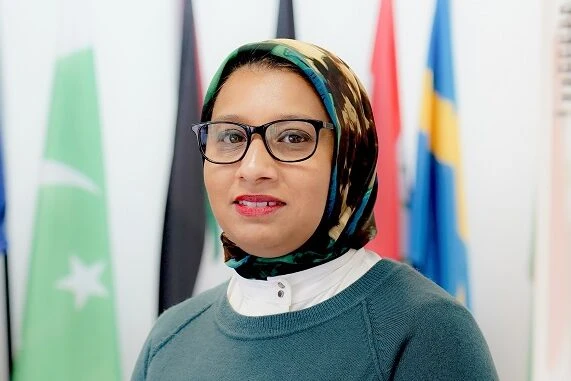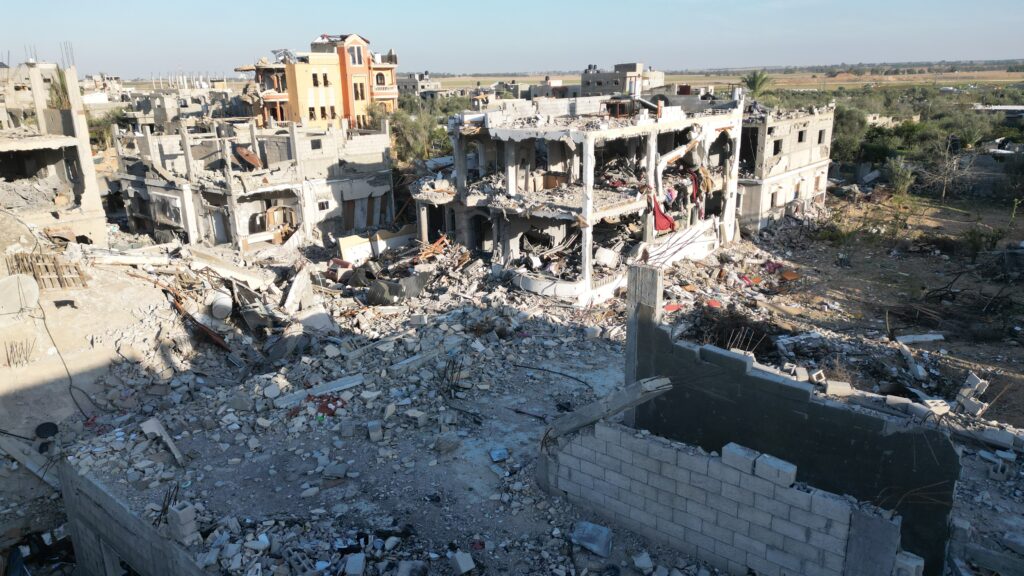As we prepare to bid farewell to 2023, Islamic Relief’s head of global advocacy, Shahin Ashraf, reflects on a year of legal milestones, humanitarian challenges, and much-needed progress in climate action.

Universal rights under attack
The erosion of commitments to universal rights is a global challenge. In 2023 the struggle for fundamental rights, including freedom of expression and peaceful assembly, mirrored a broader challenge to protect the rights essential for peaceful protest. These encompass the right to life, freedom of association, privacy, and protection from arbitrary arrest, detention, torture, and ill-treatment.
Some welcome news came in November, when the United Kingdom’s Supreme Court ruled against the government’s policy to deport asylum seekers to Rwanda, affirming the Court of Appeal’s earlier judgment. Reinforcing a much-needed commitment to justice, the ground-breaking decision validated concerns raised by the Law Society of England and Wales about the policy’s compliance with international conventions on refugees and human rights.
Humanitarian crises competing for attention and action
Amid legal battles, humanitarian crises across the globe cried out for the world’s attention. At Islamic Relief, we strained every sinew to respond to as many as possible. We provided vital aid when earthquakes shattered lives in Afghanistan, Morocco, Nepal, Türkiye, and Syria and not forgetting Gaza and the Occupied Palestine, a tragedy that we are all witness to.

We were a lifeline to flooded communities in Bangladesh and Libya, and to hungry families in the drought-stricken Horn of Africa. Islamic Relief staff did all they could to ease the suffering of ordinary people when conflict flared in Sudan. Each crisis battled for attention and support from shared funding pools, emphasising the pressing need for collective action.
A new deal to help poorer countries facing climate change
After nearly 30 years of grappling with incremental steps forward and occasional setbacks, a pivotal climate conference, COP28, brought forward a historic agreement. This landmark deal establishes funding arrangements and a dedicated fund to address Loss and Damage, particularly benefiting poorer countries vulnerable to the impacts of climate change.
These cautious steps signal a turning point in our global commitment to combating the climate crisis, but the human and economic costs of crises and disasters remain unevenly distributed.
Facing the challenges of 2024
The emerging era of humanitarianism beckons with a renewed sense of urgency and responsibility.
Governments, having relished decades of impunity, now stand at a pivotal juncture in the evolving narrative of global responsibility. The prolonged periods of unchecked authority have often bred a sense of detachment from the urgent humanitarian crises that grip various regions. This has been evidenced by the heartbreaking and devastating tragic death toll of over 21,000 Palestinian lives and the stark humanitarian disaster denounced by the UN.
The spectre of governmental inaction looms large, leaving populations vulnerable and underscoring the imperative for change. As we navigate the complex dynamics of international relations, it becomes crucial to challenge the status quo and hold governments accountable for their actions or lack thereof. This blog serves as a platform to amplify voices demanding accountability, urging a recalibration of priorities and policies. In the unfolding chapters of 2024, we find ourselves at a juncture where the call for responsible governance resonates louder than ever, seeking to usher in an era where the pursuit of justice and compassion eclipses the shadows of impunity.
In the face of this crisis, Western leaders find themselves seemingly impotent, unable to intervene effectively. The once-sturdy guardrails that restrained crises from spiralling out of control — peace treaties, humanitarian aid, and accountability for violations of international law — now stand weakened or dismantled.
As the global community anticipates the unfolding of events in 2024, there is a collective prayer and hope that leadership will transcend its perceived limitations. The new dawn on humanitarianism calls for decisive action, empathy, and a commitment to addressing the profound challenges that afflict communities in crisis. It is a moment that demands not only awareness but also a resolute demonstration of compassionate leadership to navigate the complexities of the humanitarian landscape and bring about positive change.
The question we face is profound: How do we begin to reduce human suffering? It demands a collective commitment to address the root causes of conflicts, economic turmoil, and the climate crisis. Beyond legal frameworks and international agreements, it calls for empathy, cooperation, and innovative solutions to ensure a more equitable distribution of resources, opportunities, and protections.
In light of the challenges posed by conflict and climate issues, it is crucial to recognise that millions of people are and will be currently in dire need of humanitarian assistance. Despite commendable efforts and unprecedented responses to specific appeals, the funding gap has unfortunately expanded in volume.
As we transition from 2023 to.2024. The call to action is clear: contribute, advocate, and be a catalyst for positive change in the year ahead. Let us stand united in addressing this critical gap. By supporting the humanitarian funding appeals, we can bridge divides, uplift communities, and bring hope to those facing adversity.
We thank all of our incredible supporters and partners who have contributed to our efforts in 2023, and look forward to continuing to work with you in the year ahead.
Continue supporting Islamic Relief in 2024 to enable us to reach more people in need. Please donate now.
BROWSE OTHER OPINIONS
FEATURED OPINIONS
- “We’re making sure displaced people aren’t left behind in the race against climate change in Bangladesh”
- Sadiq’s Journey: From day labourer to entrepreneur
- Central African Republic Blog #7
- Islamic Relief at the United Nations: Empowering communities for resilience
- A visit to Kosova: Entering the beehive
MOST POPULAR TOPIC
View More









